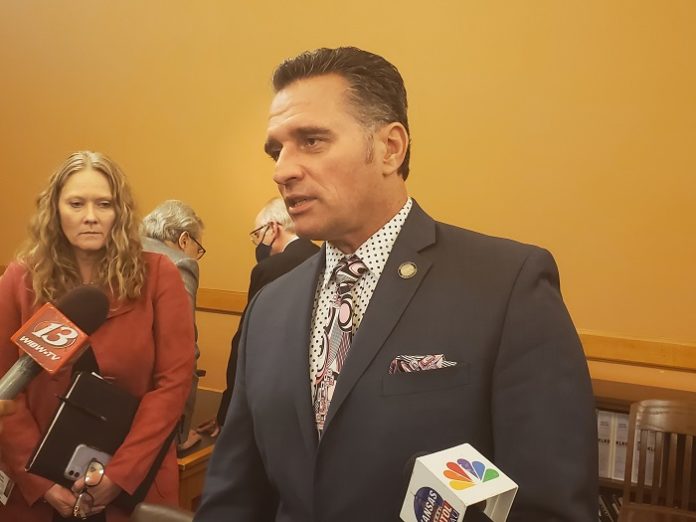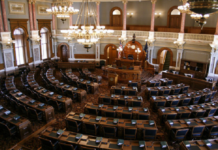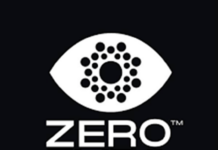Senate President Ty Masterson is not offering a promising outlook for a bill intended to provide school choice for at-risk students to attend private schools with public subsidies.
“It’s not dead, but I’m not optimistic at this point,” Masterson told KCMO’s Pete Mundo Monday morning.
Masterson said he would look at the bill when the Legislature returns for its wrapup session on May 3, but wasn’t making any promises.
While the Senate deadlocked at 20 on the bill, Masterson noted that nine Republicans voted with 11 Democrats to reject the bill.
Masterson recounted for Mundo how the bill went down with a senator he didn’t name – Republican Sen. Rob Olson of Olathe – changing his vote after supporting the bill a day earlier when the Senate deadlocked at 19.
“The joke in Topeka is you want to die there because nothing’s ever dead,” Masterson said.
“We’ll look at that. It doesn’t make me optimistic for that,” he said.
The bill contained Gov. Laura Kelly’s plan to spend $5.2 billion on public education for the 2021-22 school year, which is in line with the state Supreme Court’s order to adequately fund schools.
However, the budget was rolled together with two programs providing subsidies for struggling students to attend private schools either with scholarships backed with tax credits or allowing them to use the state’s base per-student allocation for them to attend private schools.
The bill also included another measure that would have reduced state aid for students who attended school remotely for an extended period of time, a response to the pandemic where students were forced out of the classroom for months.
The bill would have expanded a program that gives up to $10 million a year in state tax credits to entice businesses and individuals to donate money to a scholarship program for private schools.
Another provision created education savings accounts, which would allow at-risk students attending public schools to take their state base aid – about $4,500 a year – to a private school accredited by the state Board of Education or a national or regional accrediting agency.
Students eligible for the program would have included those who have a high rate of absenteeism, are homeless, are not meeting requirements for graduation or are performing below grade level, among other factors.
It was unclear how much the education savings accounts would cost the state, although it’s been suggested it could run between $23 million and $55 million depending on how many students participated in the program.
Republican Sen. Molly Baumgardner, chair of the Education Committee, said there were a mixture of issues that combined to defeat the bill.
Some lawmakers, she said, didn’t like the idea that the education budget was paired with the school-choice legislation.
Others wanted to vote on the school choice measures separate from the budget while others simply opposed those proposals outright.
“There was that combination of the school funding budget with policy and a major piece that was a tremendous change,” Baumgardner said, referring to education savings accounts as the new element.
Baumgardner said there are multiple avenues open to the Legislature.
“It really is going to be up to House and Senate leadership,” she said. “There are several ways this could go.”
She said leadership is going to need to understand why lawmakers voted the way they did in forming its decisions going forward.
Republican state Rep. Kristey Williams, chair of the K-12 budget committee, has shown little interest in breaking the bill up into pieces.
“From my perspective, policy and funding should always go together,” Williams said last week after the vote.
“There is not a scenario where I would want to just spend almost $6 billion out the door without having some accountability,” she said.
“Funding and policy,” she said, “should go hand in hand.”















